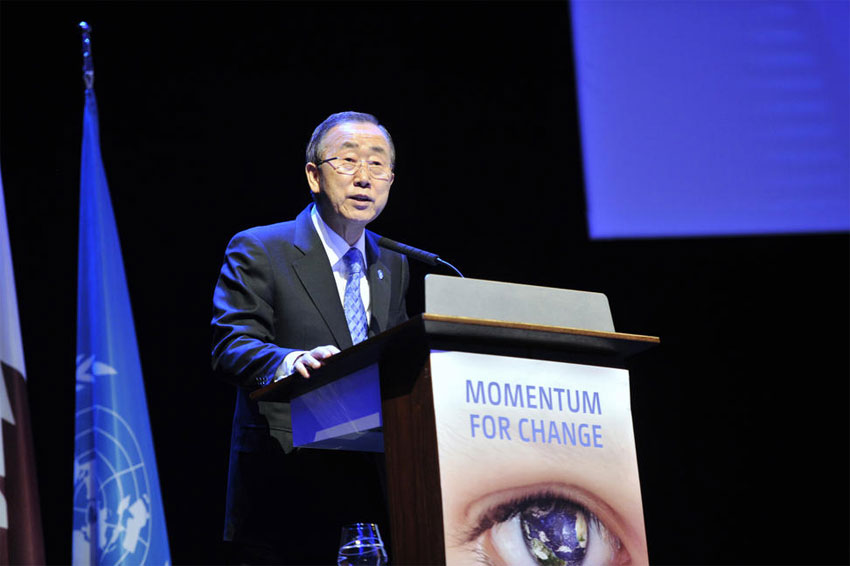The following is the speech of United Nations Secretary-General Ban Ki-moon, addressing the high-level segment of the 18th Conference of the Parties to the UN Framework Convention on Climate Change in Doha (Qatar), 04 December 2012:
Salaam aleikum. I am honoured to be with you, and I thank the State of Qatar for its hospitality in organizing this very important conference. This is the first time the UNFCCC has held its Conference of Parties in this pivotal region. It is an important signal that all regions have a role to play in solving the climate crisis, and all are resolved to do so.
Let us be under no illusion. This is a crisis. A threat to us all. Our economies. Our security. And the well-being of our children and those who will come after. The danger signs are all around.
One-third of the world’s population lives in countries with moderate to high water stress. Land degradation affects 1.5 billion people. Icecaps are showing unprecedented melting; permafrost is thawing; sea levels are rising. The abnormal is now the new normal. This year, we have seen Manhattan and Beijing under water…hundreds of thousands of people washed from their homes in Mozambique; Nigeria; Colombia; Peru, the Philippines; Australia…From the United States to India, from Ukraine to Brazil, drought decimated essential global crops. Across the Sahel, from Mali to the Horn of Africa, tens of millions of people endured another year of vulnerability, at the mercy of the slightest climate shock.
No-one is immune to climate change — rich or poor. It is an existential challenge for the whole human race – our way of life, our plans for the future. We must take ownership. We, collectively, are the problem. Then we should have the solutions.
Greenhouse gas emissions are the highest they have ever been. We are in a race against time to stay below the agreed threshold of 2 degrees centigrade above pre-industrial levels that will avoid the worst impacts of climate change. Every delay means greater future effort – or greater future harm.
Just this month, reports from UNEP, WMO and the World Bank again drew attention to the growing dangers. But they also sound a hopeful note by highlighting that we have the resources – financial and technological — to rise to the challenge. They also conclude that acting now makes better economic sense than allowing further delay. That is why it is imperative that we act now, with urgency and with clear purpose – both in these negotiations and in our countries, our cities, our businesses, our homes. Many of you have already started. Policies and actions to take us into a sustainable, clean energy future are being pursued more broadly and with greater determination. But the pace and scale of action are still not yet enough.
We have a responsibility here in Doha to sustain the momentum for change so painstakingly built in Bali, Poznan, Copenhagen, Cancun and Durban. Addressing climate change is essential to sustainable development. And your work is essential for addressing climate change. I urge all Parties to work with a spirit of compromise – to take the long view and avoid getting bogged down in minutiae. Let us ensure that we stay on track for an effective, fair, ambitious and universal climate agreement by 2015.
This week, I hope for five key deliverables by Governments here in Doha: First, the adoption of a ratifiable second commitment period of the Kyoto Protocol. The Kyoto Protocol remains the closest we have to a global, binding climate agreement. It must continue. It is a foundation to build on. It has important institutions, including accounting and legal systems, and the framework that markets sorely need. Its continuation on 1 January 2013 would show that governments remain committed to a more robust climate regime.
Second, progress on long-term climate finance. This is critical to a meaningful climate agreement. Fast-start finance expires soon. Developed countries must give their clear indications that scaled-up climate financing will flow after 2012, and that it will be commensurate to the goal of mobilizing $100 billion dollars a year by 2020 from public and private funding.
Third, we must ensure that the institutions set up in Cancun and Durban to support mitigation and adaptation by developing countries — including the Green Climate Fund and the Climate Technology Centre and Network — are fully equipped and effective.
Fourth, I expect governments to demonstrate, with no ambiguity, that negotiations on a global and legally binding instrument remain on track.
And fifth, Governments need to show how they intend to act on the gap between mitigation pledges and what is required to achieve the 2 degrees target.
The gap can be bridged. But time is not on our side.
Ladies and Gentlemen, let us speed up the transformation we know needs to happen. Let us act even as negotiations continue toward a more robust climate regime. Let us build creative partnerships that will drive courageous initiatives and innovation. Let us abandon apathy and embrace ambition. Let us take inspiration from the solutions we see around us and from the transformations that we know are possible. Let us prove to future generations that we had the vision to see where we needed to go, and the wisdom to get there. And I count on your vision and your leadership.
Thank you. Shukran jazeelan.




